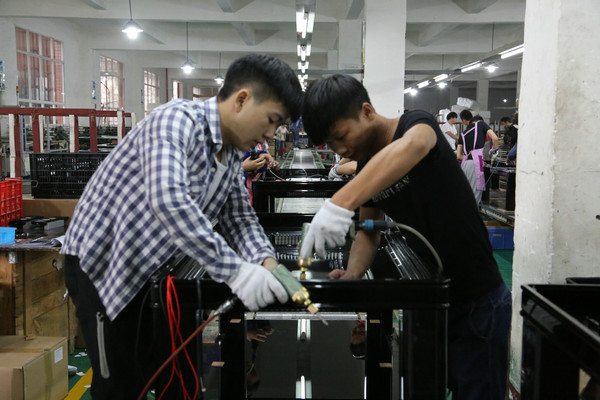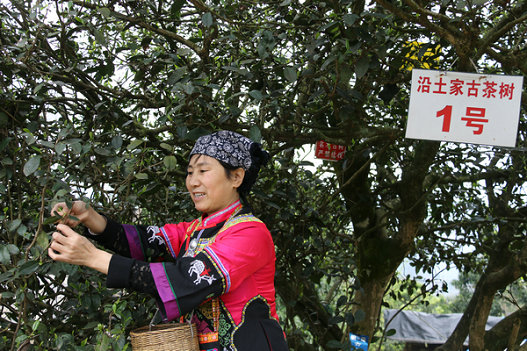 |
|
[Photo/China Daily]
|
FU DAN
Guizhou Fuju Stove Appliances Co Ltd.
XIAO SHIMEI
Yanhe Qian Nian Gu Cha Ltd
ZHAO JIANBO
Guicheng Group
DENG SHENGYI
Guizhou Xiangxiamei Food Co Ltd
LUO YONGQUAN
Chalsea
Fondness for tea-both drinking and serving guests, casual clothing and making millions ofyuan a year are a few traits common to four men and a woman in Guizhou.
They started their businesses in the 1990s and the decade after with incomes from driving taxisor planting saplings or scouring media offices for advertisements.
Fu Dan, Xiao Shimei, Deng Shengyi, Zhao Jianbo and Luo Yongquan, all of whom belong to thesame generation but possibly personally unknown to one another, today run successfulcompanies that respectively sell electrical heaters, tea, chili sauce and manhole cover, and onethat promotes culture.
By many accounts, theirs is a story of small enterprises going big in this part of Southwest Chinathat has long been a byword for underdevelopment.
In late September, China Daily interviewed four of the five entrepreneurs in their offices inGuiyang, and visited the factories of three. An associate of one of the businessmen who wasaway from the provincial capital at the time also spoke to this paper.
A few million people in the province are still poor. In China, those who earn less than 2,300 yuan($365) a year are considered to be living below the poverty line.
But of late Guizhou is witnessing an economic revival. With a GDP of around 1 trillion yuan, itgrew by 10 percent year-on-year last year as compared with the national average of 6.7 percent.Playing a role in that have been its 359,965 registered private businesses, the vast majority ofwhich are small.
Guiyang alone has 128,951 small enterprises, according to local government officials.
When the five entrepreneurs had started out, Guizhou was a very different place.
 |
|
Workers fit electrical parts at a Fuju Stove Appliances plant in the city. [Photo by Yang Jun/China Daily]
|
1 Winter's warrior
Fu Dan, 46, was born in Xifeng County in the outskirts of Guiyang, where he drove trucks for hisfirst job. Then aged 18, his familiarity with the roads of the capital got him his next employment-taxis. In 1996, he began his heaters business with four others from a rented garage aftersaving an amount from driving commercial vehicles.
His first heaters used coal and were made by people he knew in the county. Initially, he sold veryfew. By 2000, he started making electrical units-heating coils attached to the inner legs of atable-and sold hundreds. The current production capacity of his factory, which is located inGuiyang, is expected to soon touch 1 million units a year.
Other than Guizhou, where he annually sells some 1,000 units, his company meets the demandfor heaters in cities and towns along the Yangtze River that aren't covered by the central heatingsystem available in the country's north, owing mostly to shorter, milder winters here.
"When I was a truck driver, my dream was just to survive," says Fu, president, Guizhou FujuStove Appliances Co Ltd. "But today I think of larger responsibilities such as family and thefactories (a new plant goes into operation next year)."
Fu, who has two children aged 7 and 17, likes to play golf. His company's total annual income isabout 100 million yuan.
Giving a tour of his factory, he says, the heaters usually serve a 10-year cycle. Some women andmen are seen fitting the previously tested electrical circuits into table parts in a section of thebuilding, with the screeching of welding metal denting the air in an adjacent division that makesthe asbestos-laden units.
His company employs more than 200 people and sells six main products, including "hot tables"with remote-control panels. The top-of-the-line items cost nearly 3,000 yuan.
Living conditions and public policy have improved in his city over time, he says. "The traffic'sbecome better."
Guiyang's first subway line is expected to open next year. The outer walls of some brand-newstations have been decorated with Mao-era Communist artwork.
 |
|
Xiao Shimei runs a successful tea business from Yanhe, a county in Guizhou. [Photo byYang Jun/China Daily]
|
2 Tea woman
Her father's struggle with brain cancer led Xiao Shimei, 49, to buy a book on tea more than adecade ago. But she soon found her curiosity about the perceived anti-carcinogenic propertiesof tea translating into something else: What if she started a business? After all, Yanhe, hercounty in eastern Guizhou, had a large number of trees.
In 2007, she launched the Yanhe Qian Nian Gu Cha Ltd, by selling tea from trees she says areeven 800 years old. Her business seemed to have quickly picked up in a province, where in herwords, many people were drinking ugly looking tea. Other than the mainland, her company's teais now found in Hong Kong and Macao.
With two flagship stores in Yanhe that have 26 full-time employees, Xiao manages sales throughfranchises in Southwest China. She has invested nearly 1 million yuan in her brand, and is"almost there" in terms of profit, she says. The best yields fetch her 10,000 yuan per 500 gramsand the lowest are priced at 60 yuan.
At an auction last year, she sold 32 kilograms of tea at an average of 5,500 yuan a kilogram.Her black and green teas come from plantations across 2,700 hectares in Yanhe, where sheengages hundreds of pickers during harvest time from late spring to early summer, she says.The local farmers grow the trees.
Sitting in an office of one of her franchises in Guiyang, Xiao says, she's seeking to create moreawareness of her brand by integrating online and offline channels.




 京公网安备:
京公网安备:
